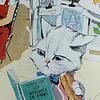Take a photo of a barcode or cover
Okay, so yes—Jane is a fiery little thing and I respect her spine of steel, but can we talk about how utterly humorless she is? It’s all brooding and morals and zero fun. Even her flirtation with Rochester feels like two philosophy students trying to out-suffer each other. Speaking of Rochester—what a gaslighting, manipulative sadboi. "Oh, I can’t legally marry you because of my other wife in the attic, but let’s just run away together anyway. For love!" Sir, that’s not romantic—that’s a felony. And let’s not pretend the side characters don’t blur together into a sea of Victorian types: the angelic martyr (Helen), the evil stepmom (Mrs. Reed), the wet blanket clergyman (St. John), and so on. Distinct, sure, but nuanced? Not really. They exist to orbit Jane’s Great Moral Journey™, not to be people in their own right.
The Gothic aesthetic works overtime to keep this story interesting—honestly, if the vibes weren’t so impeccable, this book would feel like a sermon with candlelight. But sometimes it leans a little too hard into gloom porn. Do we really need the red-room trauma and the typhus plague and the literal burning mansion? Brontë is out here trying to kill Jane with symbolism. Subtlety? Never met her. Still, the settings do carry emotional weight—Thornfield is deliciously eerie, and Lowood is practically Dickensian—but once we hit Moor House, the story loses its teeth. Suddenly we’re in pastoral purgatory being courted by a sexy colonizer? No thanks.
I’ll say it: this book could’ve used a ruthless editor. Brontë has a habit of writing like she's being paid by the comma. For every brilliant line, there’s a paragraph that reads like a thesaurus exploded. I found myself skimming Jane’s internal monologues more than I care to admit—not because I didn’t care, but because I got it the first three times, Jane. Also, I refuse to excuse the pacing crimes committed in the final act. Everything grinds to a halt while Jane goes full martyr at Moor House, and we get 200 pages of emotional constipation before she finally does what we all knew she was going to do and goes back to Rochester. Speaking of whom—
This plot had so much potential. Creepy estate, mystery wife, class/gender dynamics, proto-feminist heroine. And yet, it spends too much time moralizing and not enough actually developing its romantic core. The twists are either predictable or ludicrous—Jane just happens to stumble upon her long-lost cousins in the middle of nowhere? And inherits a fortune? Come on. It’s wish-fulfillment dressed in sackcloth and ashes. There’s also the uncomfortable fact that the book sets fire to the literal “madwoman in the attic” trope but doesn’t do a damn thing to interrogate it. Bertha exists to suffer and then conveniently die so Jane and Rochester can be legally and morally in the clear. Romantic, if you ignore the colonialist, ableist baggage.
It starts strong—childhood trauma, school from hell, mysterious rich man with weird vibes—but the second half starts to drag like a wet cloak. The whole “St. John wants to marry me for missionary clout” subplot is the literary equivalent of hitting a wall and then just lying there for 100 pages. Even the Big Gothic Reveal™—Bertha in the attic—is over too quickly to really satisfy. It’s juicy in theory, but Brontë brushes past it like she’s embarrassed by her own plot twist. Honestly, if I wasn’t so emotionally invested in Jane not getting screwed over, I might’ve given up halfway through.
Let’s not pretend this is a healthy romance. Rochester lies, manipulates, and emotionally torments Jane for 300 pages, and we’re supposed to forgive him because he got barbequed and blinded in a tragic act of divine punishment? Yikes. Jane returning to him isn’t an act of empowered choice—it’s a reward for his suffering. Meanwhile, St. John’s cold proposal is framed as just another trial for Jane’s resolve, even though it reeks of spiritual manipulation. And don’t even get me started on Bertha—whose treatment is unforgivable. The world-building also creaks under scrutiny. How did Jane suddenly become rich, and why are we just fine with it? Why is everyone either a saint or a villain?
I wanted to love this. I really did. And I enjoyed parts—the orphan angst, the gloomy mansion, Jane dunking on Rochester with moral superiority. But it’s too long, too self-serious, and too in love with its own moral posturing. I came for the Gothic scandal and stayed out of sheer stubbornness. Would I recommend it? Only with a disclaimer: expect melodrama, misogyny, and a man who really shouldn’t have been a romantic lead.
Jane Eyre is like a really intense friend who always has great stories, but never lets you get a word in and will absolutely guilt-trip you for eating dessert. Iconic, yes. Enjoyable? Sometimes. Exhausting? Also yes.
Graphic: Child abuse, Confinement, Emotional abuse
Moderate: Ableism, Domestic abuse, Infidelity, Misogyny, Physical abuse, Sexism, Suicidal thoughts, Toxic relationship, Grief, Fire/Fire injury, Gaslighting, Alcohol, Classism
Minor: Animal cruelty, Bullying, Cursing, Death, Mental illness, Racism, Self harm, Violence, Death of parent, Murder, Abandonment
I like Jane a lot. She is firm in her beliefs and in her sense of self. I enjoyed her inner monologues at times.
I didn’t like Mr Rochester at first,
I really did not like St John at all. He felt like a gaslighter and self righteous. I did really like his sisters though and loved that Jane had finally found a family to belong with.
Graphic: Confinement, Death, Mental illness, Fire/Fire injury, Gaslighting, Abandonment
Moderate: Death of parent
Minor: Suicidal thoughts
Graphic: Bullying, Child death, Cursing, Death, Emotional abuse, Misogyny, Physical abuse, Suicidal thoughts, Medical content, Medical trauma, Fire/Fire injury, Alcohol, Injury/Injury detail
Graphic: Bullying, Child abuse, Child death, Confinement, Death, Emotional abuse, Hate crime, Mental illness, Misogyny, Racism, Terminal illness, Toxic relationship, Violence, Blood, Medical content, Dementia, Grief, Religious bigotry, Abandonment, Injury/Injury detail
Moderate: Ableism, Body shaming, Physical abuse, Suicidal thoughts, Fire/Fire injury, Classism
Minor: Alcoholism, Animal cruelty, Animal death, Domestic abuse, Fatphobia, Incest, Infidelity, Racial slurs, Slavery, Suicide, Xenophobia, Death of parent, Alcohol
Graphic: Bullying, Child abuse, Child death, Chronic illness, Confinement, Domestic abuse, Mental illness, Racism, Suicidal thoughts, Suicide, Terminal illness, Forced institutionalization, Medical trauma, Schizophrenia/Psychosis , Fire/Fire injury
Moderate: Ableism, Colonisation, Classism
Minor: Racial slurs, Slavery
Graphic: Death, Domestic abuse, Misogyny, Toxic relationship, Forced institutionalization, Death of parent, Classism
Moderate: Ableism, Child abuse, Confinement, Suicidal thoughts, Grief, Suicide attempt, Schizophrenia/Psychosis , Fire/Fire injury
Minor: Incest, Racism, Religious bigotry, Colonisation
Graphic: Mental illness, Forced institutionalization, Fire/Fire injury, Gaslighting
Moderate: Bullying, Child abuse, Child death, Chronic illness, Confinement, Death, Emotional abuse, Suicidal thoughts, Suicide, Terminal illness, Toxic relationship, Suicide attempt, Classism
Minor: Cursing, Incest, Infidelity, Racism, Sexism, Violence, Blood, Grief, Death of parent, Toxic friendship, Alcohol, Colonisation, Injury/Injury detail
If it were for that I'd give it 5 stars, however the 2nd half is heavily racist, ableist, xenophobic, and classist. Themes of colonialism and religious missions, institutionalisation, grooming (Jane is sadly very much groomed by the men in her life), etc. There is no condemnation of any of this, no revolt against bigotry in the narrative. Therefore, I can't give it a pass for being "of its time", as there are many classics which either resist against or refuse to entertain such bigotry.
Graphic: Ableism, Child abuse, Child death, Confinement, Death, Domestic abuse, Infidelity, Mental illness, Racial slurs, Racism, Sexism, Toxic relationship, Xenophobia, Religious bigotry, Fire/Fire injury, Gaslighting, Toxic friendship, Abandonment, Pandemic/Epidemic
Moderate: Incest, Suicide, Violence, Grief, Schizophrenia/Psychosis , Colonisation, Classism
Minor: Drug abuse, Physical abuse, Suicidal thoughts, Forced institutionalization, Antisemitism, Death of parent
Side rant, it rather drives me crazy that people turn it into a she must marry Rochester OR St. John situation when she easily could have just...not married either. Given that her cousins both successfully met and married other men, I think it's safe to assume they probably had friends they could introduce her to? They weren't the only men in England?
Anyways, it is very well written and enjoyable, but I'd only recommend it if I knew the reader would read it thoughtfully.
Graphic: Death, Suicidal thoughts, Toxic relationship, Fire/Fire injury, Abandonment
Moderate: Child abuse, Child death, Emotional abuse
Graphic: Body shaming, Bullying, Child abuse, Death, Emotional abuse, Incest, Physical abuse, Racism, Suicidal thoughts, Toxic relationship, Grief, Death of parent, Fire/Fire injury, Gaslighting, Abandonment, Classism
Minor: Antisemitism







